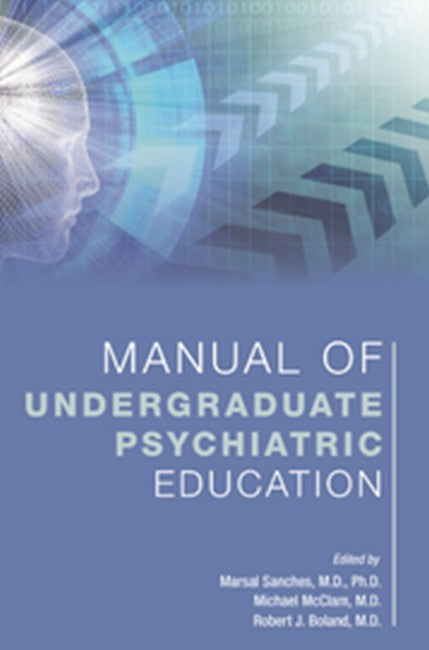Marsal Sanches, M.D., Ph.D., is Professor in the Department of Psychiatry and Behavioral Sciences at McGovern Medical School and Attending Psychiatrist and Associate Director for Research at Dunn Behavioral Sciences Center at UTHealth Houston in Texas. Michael McClam, M.D., is Assistant Professor in the Menninger Department of Psychiatry at Baylor College of Medicine in Houston, Texas. Robert Boland, M.D., is Senior Vice President and Chief of Staff of The Menninger Clinic and Professor and Vice Chair of the Menninger Department of Psychiatry and Behavioral Sciences at Baylor College of Medicine in Houston, Texas.
Request Academic Copy
Please copy the ISBN for submitting review copy form
Description
Part I: General Themes in Undergraduate Psychiatric Education Chapter 1. Integrating Psychological, Social, and Behavioral Concepts into Undergraduate Medical Education Chapter 2. Mental Health and Well-Being in Medical Student Education Chapter 3. Stigma and Attitudes Towards Psychiatry Among Medical Students: A Case Study Chapter 4. Fostering Interest in Psychiatry Among Medical Students Part II: Practical Aspects of Undergraduate Psychiatric Education Chapter 5. Theories of learning and their implications for psychiatric education Chapter 6. The psychiatry clerkship Chapter 7. Psychiatry Electives Chapter 8. Psychotherapy education for medical students Chapter 9. Education in psychiatric research for medical students Chapter 10. Assessment and feedback to medical students during psychiatry rotations Part III: Teaching Techniques Chapter 11. Teaching the Psychiatric Interview to Medical Students Chapter 12. Clinical Pearls in Psychiatry: What all Students Should Know Chapter 13. Ten psychiatry reading materials I usually recommend to my students Chapter 14. The art of a good presentation in psychiatry: teaching techniques and slide preparation Chapter 15.Beyond Lecturing: Flipped Classroom, Problem-Based Learning, and other Active Learning Strategies to Teach Psychiatry Chapter 16. Remote learning and new technologies in the teaching of psychiatry Chapter 17. The role of simulation in teaching psychiatry to medical students Part IV: Special Themes in Undergraduate Psychiatric Education Chapter 18. Ethico-legal considerations for psychiatry educators Chapter 19. Diversity, Equity, and Inclusion in Psychiatric Education Chapter 20. Career Development and Leadership as an Undergraduate Medical Educator in Psychiatry: Some Advice Appendix The Teaching of Psychiatry for Undergraduate Students in the United States and Canada: Accreditation and Licensure Examination Implications

